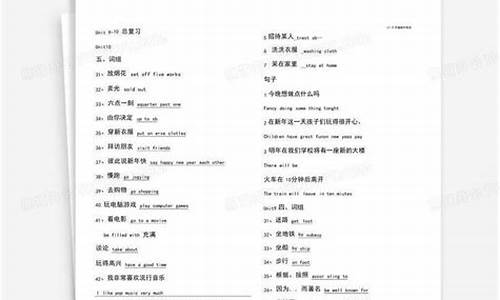春季高考英语单词表-春季高考英语知识点
1.春季高考是考的哪几科
2.2011上海市春季高考英语听力原文 急求!!!
春季高考是考的哪几科

春季高考考试科目:语文(120分)、数学(120分)、英语(80分)。专业理论知识:200分、专业技能230分。满分分值与夏季高考一样都是750分。
春考的考试科目
语文120分(与普高的文言文和诗词略有差异)
1.考题内容:语言知识、语言表达、文学文化常识、诗词(30%)、现代文阅读(25%)、古诗文阅读(10%)写作(35%)
2.考题题型:单选题(40%),填空、简答、写作(60%)
3.难易程度:课本内水平
数学120分(可以使用科学计算器)
1.考题内容:代数(50%)三角函数(15%)、平面几何解析(20%)、立体几何(10%)、概率与统计(5%)
2.考题题型:单选题(50%)、填空解答题证明题(50%)
3.难易程度:普通高中会考难度水平上下
英语80分(不考听力)
1.考题内容:英语知识运用(35%)、阅读理解(25%)、情景对话(10%)、短文填空(15%)、职场应用(15%)
2.难易程度:等同于初三高一水平,高于中考低于会考。
专业知识200分:
1.考题题型:选择题(50%),简答题、分析论述题、综合应用题(50%)
2.难易程度:等同文理综,基本与历年真题题型一致
专业技能230分:
1.考题题型:全部为基础技能,0基础经过系统培训都可以获得高分,所设专业技能成绩都可取得约220分,或高于全省平均线30分以上。
2.难易程度:考2~3项,考试内容会在考前一周公布样题,部分专业考场进行抽签,例如,学前教育,考前一周知道钢琴考试曲目,正式考试时在考场进行具体曲目抽取,然后进行表演。
注:以上信息来源于网络,仅供大家参考,具体的科目分值及其难易程度清大家参考往年的考试。
春季高考对于考生有哪些优势
1.考试难度低
春季高考是“文化知识+技能测试”,文化考试的难度不高,而技能方面,一般学生在学校里已经达到很好的水准,考试相对容易通过。对于基础的文化课,春季高考只考语数英三科,难度较夏考更低,且英语满分只有80,对于英语基础差的同学太友好了。
2.考试竞争小
根据近几年数据显示,实际参加春季高考的人数约为普通高考人数的八分之一,可想而知的竞争小了很多,考学几率更大。
3.职教高考本科扩招
很多人可以通过春季高考的形式走上本科。
4.待遇相同
通过春季高考考上的大学和夏季高考各方面待遇是一样的,统一录取,统一编班,统一入学,统一毕业,毕业证书是完全一样的,是国家承认的。
5.就业优势
参加春季高考考上大学的学生毕业后在找工作方面会更有优势,社会上对于技能应用型人才需求量大,前景较好。
2011上海市春季高考英语听力原文 急求!!!
Listening Comprehension
Section A
1. W: It’s nice of you to come here to pick me up, Mr. Smith.
M: Don’t mention it. How was the flight?
Q: Where does the conversation most probably take place?
2. W: I wonder if there is a service charge for our meal.
M: I think so. The menu said the service charge is 10%.
Q: How much is the service charge if the food costs 50 dollars?
3. M: Here is your room key and the checkout time is 12 noon.
W: Thanks for reminding me.
Q: What is the most probable relationship between the two speakers?
4. W: Sorry, sir. We are working on your order right now and we’ll be delivering it soon.
M: Soon? How soon is soon?
Q: How does the man feel?
5. M: Hi, Jane. It’s been ages. You haven’t changed a bit!
W: Except for the hair!
Q: What does the woman mean?
6. W: OK, Mathew. Time for bed.
M: But mom, the talent show is starting in 5 minutes.
Q: What does the man mean?
7. M: Hi, Jenny. How are you getting on with your packing?
W: I’m still deciding what to take with me.
Q: What can we learn about Jenny?
8. M: Everybody is here except John. Shall we start the meeting?
W: If we wait for John. We might be here all night.
Q: What does the woman mean?
9. M: I’m glad you are finally moving.
W: I can’t tell you how happy I am. I won’t have to listen to my neighbor’s TV.
Q: What can we learn about the woman?
10. M: Oh, we left our road map at home.
W: Well, since we haven’t gone very far. We might as well just turn around.
Q: What will the speakers probably do?
Section B
Blank 11-13 are based on the following Passage.
The Common Wealth is a group of 54 countries. The member states all use English as a common working language and have similar legal and education systems, but represent nearly every religion, race and political system on the planet. The Common Wealth is active in a huge number of areas such as health and economics. The heads of meeting is held every two years where the leaders of the member states get together to discuss current issues. Common Wealth Day is held in the second week of March every year when Common Wealth’s citizens, particularly children, have a chance to celebrate their friendship. The Common Wealth also holds sporting and arts events. There is an annual writer’s price and a yearly arts and crafts competition. Perhaps the most well-known event sponsored by organization is the Common Wealth games, which is held every four years in one of the member countries. The games have gained another name, the friendly games because of their reputation for good-natured competitiveness.
Questions:
11. What do the member states of the Common Wealth have in common?
12. What do people do on Common Wealth Day according to the passage?
13. What is the passage mainly about?
are based on the following speech.
There is a popular belief that a college education is something to be endured in order to become qualified to obtain certain kinds of jobs or to go to graduate school. This is not what we are trying to do at Harvard. The most obvious goal of a college educationer is to give knowledge, but it is far from the most important. Remarkably few of the facts you learn here will remain in your memory for many years, and some of those that do might be proved false by new knowledge. At Harvard, we have looked to other things we can give that will last a little longer. Among these things are certain habits of mind, such as the ability to have more critical analysis, to make more accurate and logical use of information and so forth. In addition to these habits of thought, it is our hope that we can help you develop certain attitudes of mind like a willingness to accept uncertainty and the lack of definite truth. Beyond providing these qualities, a college education should try to lay a foundation for the creative use of leisure time which can be cultivated in the classroom. Yet, the cultivation of this ability will also occur outside of the classroom. For example, on sports fields, in music rooms, and so on.
Questions:
14. Which of the following is regarded as the most important at Harvard?
15. Which quality mentioned below can be cultivated both inside and outside the classroom?
16. What is the speech mainly about?
Section C
Blank 17-20 are based on the following conversation.
W: Good morning! Green Sense. Can I help you?
M: Hello, my name is Mary White and I want to complain about a sea food restaurant.
W: OK, can I take down your telephone number?
M: My phone number is 655038.
W: Good! So what would you like to complain about?
M: Actually two things. First, the restaurant dumps its rubbish on the street and you can imagine what that attracts—rats!
W: Right! I’ve got that! And the second problem?
M: The restaurant doesn’t put bottles and cans in recycling bins. It’s not responsible.
W: Got it! What’s the address of the sea food restaurant?
M: It’s 449 Shanghai Street.
W: OK! We’ll look into it and call you back.
M: Thank you. Goodbye!
Complete the form. Write ONE WORD for each answer.
Blank 21-24 are based on the following conversation.
W: What’s the article about?
M: It’s basically about memory. And it says you’ve got three memories: short term, medium term and long term.
W: Um…
M: They say that short term memory lasts only a few seconds. So you just sort of read something and you remember the beginning of the sentence just until you get to the end of the sentence.
W: Um…
M: And then medium term memory. The example they give is something like trying to remember that you’ve got to buy bread.
W: Like a sort of a shopping list of things to do?
M: Yeah! After you buy bread, you don’t need to store that memory. So it’s erased.
W: Just sort of a day-to-day management.
M: Eh…then long-term memory. They are talking about the major events that happen in your life such as your wedding.
W: And you never forget them.
M: Yeah…I suppose so. Permanent memory.
谢谢
声明:本站所有文章资源内容,如无特殊说明或标注,均为采集网络资源。如若本站内容侵犯了原著者的合法权益,可联系本站删除。












